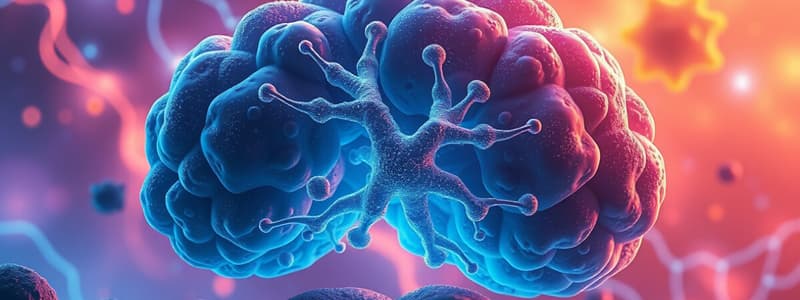Podcast
Questions and Answers
What are the two main subgroups of cholinergic antagonists based on their receptor affinities?
What are the two main subgroups of cholinergic antagonists based on their receptor affinities?
- Muscarinic and Nicotinic (correct)
- Histaminergic and Serotonergic
- Alpha and Beta
- Dopaminergic and GABAergic
What is the primary effect of atropine when blocking muscarinic receptors?
What is the primary effect of atropine when blocking muscarinic receptors?
- Induces mydriasis (correct)
- Stimulates salivation
- Causes bronchoconstriction
- Leads to hypotension
Which type of drug specifically blocks acetylcholine activity at the neuromuscular junction?
Which type of drug specifically blocks acetylcholine activity at the neuromuscular junction?
- Neuromuscular junction (NMJ) blockers (correct)
- Sympathomimetics
- Cholinergic agonists
- Ganglion blockers
What is the primary action of non-depolarizing neuromuscular blockers?
What is the primary action of non-depolarizing neuromuscular blockers?
In what clinical situation might atropine be especially useful?
In what clinical situation might atropine be especially useful?
Which of the following is a potential consequence of succinylcholine administration in susceptible patients?
Which of the following is a potential consequence of succinylcholine administration in susceptible patients?
What general classification is given to cholinergic antagonists based on their action?
What general classification is given to cholinergic antagonists based on their action?
What effect does succinylcholine have on intraocular pressure?
What effect does succinylcholine have on intraocular pressure?
Which of the following statements about G-Protein Coupled Receptors (GPCR) and cholinergic antagonists is true?
Which of the following statements about G-Protein Coupled Receptors (GPCR) and cholinergic antagonists is true?
Which of the following actions is NOT expected when administering a cholinergic antagonist?
Which of the following actions is NOT expected when administering a cholinergic antagonist?
Which of the following statements about succinylcholine is false?
Which of the following statements about succinylcholine is false?
What is the degradation product of succinylcholine that is of interest?
What is the degradation product of succinylcholine that is of interest?
Which of the following conditions might contraindicate the use of cholinergic antagonists?
Which of the following conditions might contraindicate the use of cholinergic antagonists?
What is the primary effect of low doses of atropine?
What is the primary effect of low doses of atropine?
What happens to heart rate when higher doses of atropine are administered?
What happens to heart rate when higher doses of atropine are administered?
What is a crucial clinical consideration when administering atropine to pediatric patients?
What is a crucial clinical consideration when administering atropine to pediatric patients?
What is the significance of atropine's ability to enter the CNS?
What is the significance of atropine's ability to enter the CNS?
Massive doses of atropine may be required to counteract which of the following?
Massive doses of atropine may be required to counteract which of the following?
Atropine primarily blocks which type of receptors to exert its effects?
Atropine primarily blocks which type of receptors to exert its effects?
Which of the following is NOT an effect of atropine as described?
Which of the following is NOT an effect of atropine as described?
In the context of cholinergic antagonists, atropine's effect on M2 receptors mostly impacts which part of the heart?
In the context of cholinergic antagonists, atropine's effect on M2 receptors mostly impacts which part of the heart?
Why is the monitoring of atropine dosage important in the treatment of poisoning?
Why is the monitoring of atropine dosage important in the treatment of poisoning?
How does atropine facilitate an increase in acetylcholine release?
How does atropine facilitate an increase in acetylcholine release?
What is the primary function of cholinergic antagonists in the context of neuromuscular blocking?
What is the primary function of cholinergic antagonists in the context of neuromuscular blocking?
In which situation would neuromuscular blocking agents be most appropriately utilized?
In which situation would neuromuscular blocking agents be most appropriately utilized?
What happens to sodium channels after initial opening during neuromuscular blocking?
What happens to sodium channels after initial opening during neuromuscular blocking?
Which of the following best describes the term 'paralytic agents' as used in neuromuscular blocking?
Which of the following best describes the term 'paralytic agents' as used in neuromuscular blocking?
What is a potential use of non-depolarizing neuromuscular blocking agents during surgery?
What is a potential use of non-depolarizing neuromuscular blocking agents during surgery?
Which symptoms are associated with antipsychotic-induced extra pyramidal symptoms (EPS)?
Which symptoms are associated with antipsychotic-induced extra pyramidal symptoms (EPS)?
What are the two categories of neuromuscular blocking agents?
What are the two categories of neuromuscular blocking agents?
How do cholinergic antagonists affect muscle relaxation during surgical procedures?
How do cholinergic antagonists affect muscle relaxation during surgical procedures?
Which of the following statements is true regarding the use of neuromuscular blockers?
Which of the following statements is true regarding the use of neuromuscular blockers?
What is a key clinical benefit of using neuromuscular blocking agents in anesthesia?
What is a key clinical benefit of using neuromuscular blocking agents in anesthesia?
What is the primary therapeutic use of Ipratropium?
What is the primary therapeutic use of Ipratropium?
Which of the following drugs is considered a semi-synthetic muscarinic antagonist?
Which of the following drugs is considered a semi-synthetic muscarinic antagonist?
What is the primary action of ganglionic blockers?
What is the primary action of ganglionic blockers?
What is the duration of action for Tropicamide?
What is the duration of action for Tropicamide?
What distinguishes Tiotropium from Ipratropium in terms of dosing frequency?
What distinguishes Tiotropium from Ipratropium in terms of dosing frequency?
What is the role of Benztropine in therapy?
What is the role of Benztropine in therapy?
Which of the following is NOT a neurotransmitter released as an effect of nicotine?
Which of the following is NOT a neurotransmitter released as an effect of nicotine?
Which drug produces mydriasis for a duration of 24 hours?
Which drug produces mydriasis for a duration of 24 hours?
Which receptor subtype does Benztropine primarily target as a muscarinic antagonist?
Which receptor subtype does Benztropine primarily target as a muscarinic antagonist?
Study Notes
Cholinergic Antagonists Overview
- Acetylcholine receptor antagonists are classified into muscarinic and nicotinic subgroups based on receptor affinities.
- Muscarinic antagonists primarily block the parasympathetic tone, categorized as parasympatholytics.
Muscarinic Receptor Antagonist
- Atropine:
- Acts as an antagonist to muscarinic receptors, leading to mydriasis (dilation of pupils) and altered heart rate.
- Low doses can slightly decrease heart rate by blocking M1 receptors, while higher doses increase heart rate by blocking M2 receptors on the SA node.
- Important for managing central toxic effects of anticholinesterases.
Neuromuscular Blocking Agents
- Goals: Facilitate tracheal intubation and ensure complete muscle relaxation during surgery.
- Types:
- Depolarizing agents (e.g., Succinylcholine):
- Causes persistent depolarization followed by paralysis.
- Does not get destroyed by acetylcholinesterases.
- Can raise intraocular, intragastric, and intracerebral pressure.
- Non-depolarizing agents:
- Block acetylcholine at nicotinic receptors, preventing muscle contraction.
- Depolarizing agents (e.g., Succinylcholine):
Semi-Synthetic and Synthetic Muscarinic Antagonists
- Examples:
- Ipratropium and Tiotropium: Quaternary derivatives approved for bronchospasm associated with COPD, acting only in the pulmonary system.
- Tropicamide: Induces mydriasis for about 6 hours; shorter duration compared to atropine.
- Cyclopentolate: Induces mydriasis for 24 hours.
Nicotinic Receptor Antagonist
- Ganglionic Blockers:
- Act nonselectively on nicotinic receptors in both sympathetic and parasympathetic autonomic ganglia.
- Rarely used in therapy but serve as experimental tools.
Effects of Nicotine
- A toxic component in cigarette smoke that stimulates ganglia but has no therapeutic benefits; leads to paralysis of ganglia.
Neurochemicals Released Due to Nicotine
- Dopamine: Induces pleasure and appetite suppression.
- Norepinephrine: Increases arousal and appetite suppression.
- Acetylcholine: Enhances arousal and cognitive functions.
- Glutamate: Promotes learning.
- Serotonin: Affects mood and appetite suppression.
- β-endorphin: Reduces anxiety.
- GABA: Decreases anxiety levels.
Clinical Implications
- Pediatric patients often require atropine pre-surgery due to higher crying which affects heart rate and stability.
- Neuromuscular blockers are clinically essential for surgeries to manage muscle tension and ensure patient comfort.
Studying That Suits You
Use AI to generate personalized quizzes and flashcards to suit your learning preferences.
Related Documents
Description
This quiz covers the pharmacology of cholinergic antagonists, specifically focusing on acetylcholine receptor antagonists. It explores the division of these antagonists into muscarinic and nicotinic subgroups, providing a deeper understanding of their mechanisms and applications. Ideal for students of pharmacology looking to test their knowledge on this topic.




